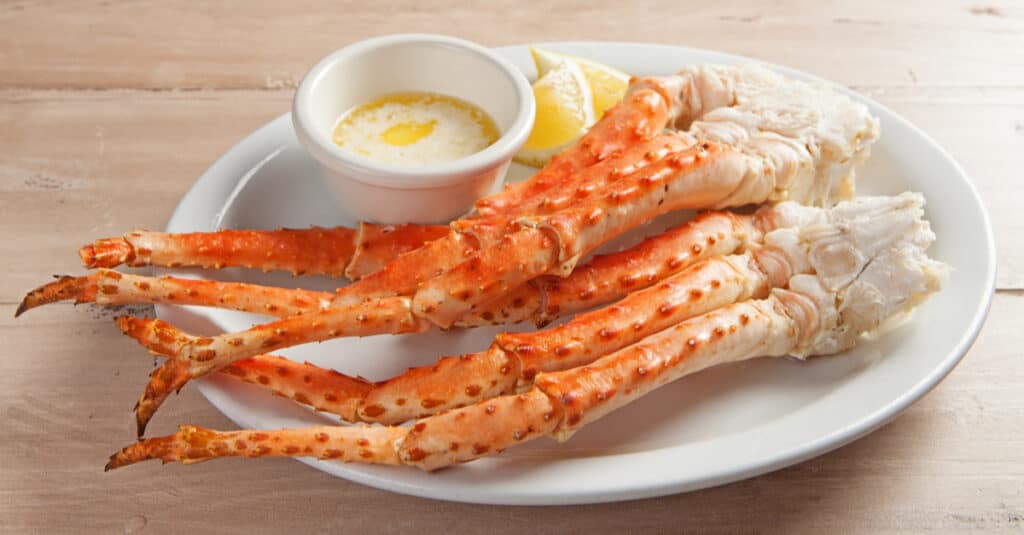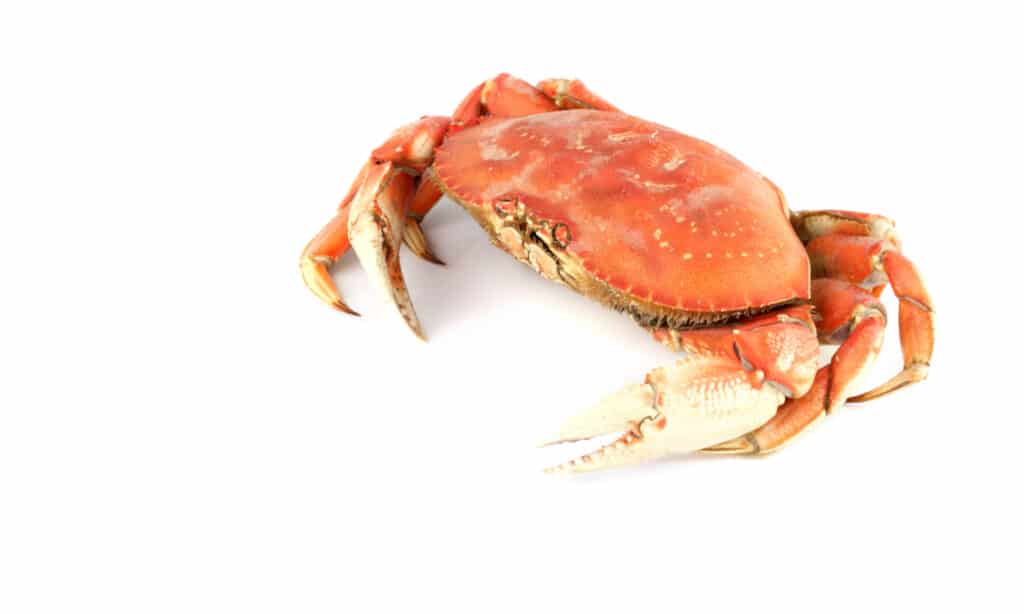As responsible pet owners, we always want to give our pups the best food that we can, while also giving them some of the treats that they love! It isn’t always easy, especially because dogs can’t eat the same things that humans can. Knowing every food that dogs can and can’t have can be a lot, but thankfully, there is some helpful information out there to help guide us! Today, we are going to explore everyone’s favorite seafood, crabs! Can dogs eat crabs or not? Let’s find out together.
Can Dogs eat Crab?

Dogs can eat small amounts of cooked and de-shelled crab meat.
©GoodFocused/Shutterstock.com
As a general rule, crab meat is fine for dogs to eat.
Crab meat is a lean protein that has a few micronutrients that your dog will probably love. Still, it’s important to remember that just because a food isn’t toxic for dogs doesn’t mean they should eat a lot of it. If you plan on giving your dog crab meat, there are a few things that you should remember.
First, always remember to cook the crab meat before feeding it to your pup. Cooking crab meat is a great way to ensure that it’s safe to eat. Uncooked, raw crab meat has a high potential to carry bacteria and parasites that are dangerous to your dog. If your pup happens to pick up a parasite from eating raw crab, it will require extensive deworming and potentially cost you a lot of money.
Secondly, remember to test a small amount before giving a large amount. Just like humans, dogs have the potential to have an allergic reaction to shellfish, and you will want to make sure no such reaction happens. A small portion is a great way to check for any reactions before a larger one is given. Additionally, some crab has high levels of iodine, a chemical that isn’t bad for dogs, but one that some can be sensitive to. If your dog has an iodine sensitivity, too much crab could cause its stomach to be upset.
Third, remember to remove any shells. Although de-shelling a crab is hard work, it shouldn’t be left to your pup. Dogs don’t know to discard the shells and will almost always end up swallowing them. Cooked and raw crab shells alike can be extremely sharp and have the potential to cut or puncture your dog’s mouth or intestinal tract. In nature, the crab’s shell is intended as protection against being eaten, so it makes sense that it can cause harm!
When in doubt, refer to our guide for the best dog foods for your pup!
Are Crab Shells bad for Dogs?

Crab shells can damage your dog’s mouth and intestines.
©Yellowj/Shutterstock.com
Most types of whole crab come in the form of crab legs or even whole crab (like blue crab). If you plan on cooking crab with the shell, make sure that your dog doesn’t get any of it. Crab shells can be extremely sharp and can cause damage to your dog’s mouth and intestinal tract. In the same way that a human can’t eat crab shells because they are too tough, your pup can’t eat them either.
Another option is to purchase de-shelled crab from the store. This type of crab usually comes in a container and has already been de-shelled. In this case, it’s ok to simply add a little bit to your dog’s bowl as a small treat.
Is Raw Crab bad for Dogs?
Although cooked crab can be given to your dog in small amounts, raw crab should never be given to your dog. Additionally, dogs should be monitored while on the beach, as a resourceful pup has the potential to snap up a small crab and eat it whole.
Dogs shouldn’t eat raw crab for the same reason that humans shouldn’t: crabs are highly parasitic. The most common parasite that crabs have is known as the lung fluke (flatworm). These worms cause an illness known as paragonimiasis and can result in parasitic infections in the GI tract and lungs.
Side effects of eating Crab for Dogs
Cooked, de-shelled crab can be fed to dogs without much worry. Still, raw crab or crab that hasn’t been deshelled has the potential to harm your dog. Here are some side effects.
If your dog eats raw crab, the most common side effect is known as paragonimiasis. This is a parasitic infection in the lungs and GI tract which can result in fever, diarrhea, or abdominal pain. If it isn’t treated, a bloody cough may also occur. Although this condition is rare, it is possible to get these worms from eating raw crab. Thankfully, treatment with antiparasitic medication is usually enough to rid your dog of the infection.
If your dog eats shells, the most common side effect is damage to the mouth or the GI tract. Crab shells are extremely tough and sharp, and often have distinct spines on them. If your dog were to bite a spine, it could puncture or otherwise wound its mouth. Additionally, swallowed bits of shell can puncture the stomach lining and the intestinal tract.
Up Next:
- What Foods Can Dogs Eat Safely, and Which Are Dangerous?
- Can Dogs Eat Raw Meat? Only Some, Avoid These 3 Killers
- 4 Reasons Dogs Can (and Should) Eat Peas
- 3 Reasons Dogs Can’t Eat Pecans Safely
The photo featured at the top of this post is © iStock.com/ANDREYGUDKOV
Ready to discover the top 10 cutest dog breeds in the entire world?
How about the fastest dogs, the largest dogs and those that are -- quite frankly -- just the kindest dogs on the planet? Each day, AZ Animals sends out lists just like this to our thousands of email subscribers. And the best part? It's FREE. Join today by entering your email below.
Thank you for reading! Have some feedback for us? Contact the AZ Animals editorial team.






